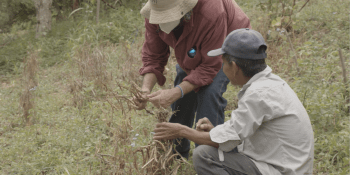Generating a climate conscience through south-south learning

Senegal is a country where for millennia farmers have learned to manage their climate. There is tremendous indigenous knowledge about indicators of climate, and incredibly advanced knowledge on managing food security in a country where not a drop of rain falls for 8 months of the year.
In Colombia, climate still has the upper hand over the farmers. The abundant water resources and “eternal spring” that many regions of the country experience means that climate is an almost afterthought for most of the population.

Farm landscape in Colombia, still untouched by climate change. Climate variability however is still projected to severely affect the country. Photo: N. Palmer
However, recent climate variability has caused significant damage to the country’s infrastructure, and wreaked havoc for farmers who have experienced both floods and droughts in the past three years. And so history has brought Senegal and Colombia together for a learning exchange on how to bring climate into the conscience of a nation.
Learn more: watch video about climate change in Colombia
Central to the learning process is the district of Kaffrine, where the CGIAR Research Program on Climate Change, Agriculture and Food Security (CCAFS) is working with the national meteorological institute (ANACIM), the Department of Agricultural Extension, and a range of local institutions to deliver seasonal forecasts to farmers.
After just three years, the region has shown how climate information services can revolutionise farming, and the good results are already spilling over into three other regions which are now adopting similar approaches.
Watch video on our current climate information work in Kaffrine, Senegal.
The Colombian delegation, made up of officials from the rice and cereals crops sector (FEDEARROZ and FENALCE), the national meteorological institute (IDEAM), and the National University of Colombia came to Senegal to witness how a country, where climate is at the core of culture and society, is taking a global lead in the management of climate variability.
The exchange, with the support of the International Center for Tropical Agriculture (CIAT) and CCAFS staff, consists of a day in the field, where seeing is believing; followed by a facilitated exchange workshop where both countries share their experiences and approaches to climate adaptation.

Latin America Regional Program Leader Ana M Loboguerrero Talking to a farmer working in his field in Senegal. Photo: A. JArvis
The whole learning process is being documented, and is embedded within a far-reaching partnership that CCAFS, CIAT and the Ministry of Agriculture and Rural Development of Colombia have established. The lessons learnt are to cross the Atlantic and be implemented in Colombia. The hope being that the Colombian agricultural sector sees climate not only as a nuisance, but an opportunity to maximize farmer livelihoods.
For Senegal, this process only foments the importance of the Kaffrine experiment, and highlights the need to scale this experience out to a national level. When 10 agriculture stakeholders from Colombia are willing to fly 36 hours and take a week out of their busy schedules to listen to the Senegal experience, Senegal should take pride that what is occurring in Kaffrine is a treasure worth protecting and duplicating.
So who knows when Senegal and Colombia will meet again, but it could just be in Brazil 2014. At least for this exchange our forecast is that the result will be a well-earned draw.
Get all the latest updates on our work in Kaffrine, Senegal
Did you know that we are now working in Latin and Central America? Learn more on the Regional Pages.
Andrew Jarvis is Theme Leader for Long-term adaptation. Dr. Jarvis is based at the International Center for Tropical Agriculture (CIAT), in Colombia.



